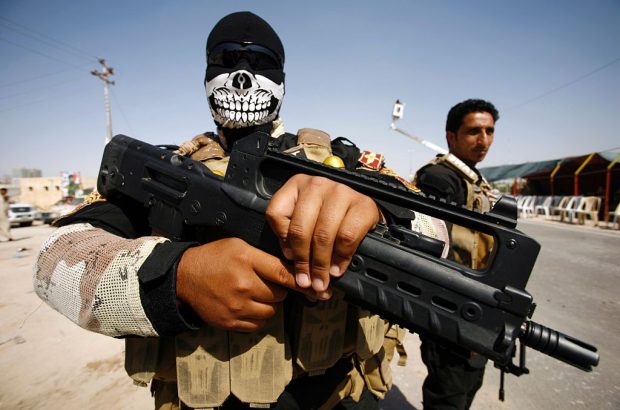As the sun set over the frontline in northern Iraq on the first day of the long anticipated Mosul offensive, Kurdish peshmerga and Iraqi army soldiers began to celebrate the first victories over Islamic State. Almost a dozen villages had been taken yesterday, and more than 77 square miles liberated southeast of the Isis stronghold.
The offensive to re-take Mosul, the last major city held by Isis in Iraq, has been more than a year in planning. It was long anticipated all along the hundreds of miles of frontline where the peshmerga and the Iraqi army have been fighting Isis. When I was in Tel Skuf in June last year, men would peer through their binoculars across the miles of flat, grassy, desiccated landscape and say ‘we’ll go when the orders come’. Mosul was only 18 miles away. For many refugees, such as the Assyrian Christians that Isis expelled and persecuted, it was frustrating. They could still see the villages they once lived in.
Now zero hour has come. In the last week, Iraqi army troops, artillery and armoured vehicles were carried north on trailers, and have now been deployed alongside the Kurdish peshmerga. This is a new kind of war on Islamic State. Over the last two years, the Iraqi government has largely fought its own war against Isis in central Iraq, while the Kurds have been fighting Isis in the north. But as Isis lost town after town to the coalition forces, backed by US-led bombing and special forces raids, these individual wars against a common enemy have started to fuse together. Isis presents itself like a modern-day version of the Greek mythical monster Scylla: yet its once-vaunted legions of fighters, bolstered by tens of thousands of foreign volunteers, have been defeated. Isis has lost ground in Syria, and even the group’s claims about the ‘martyrdom’ that its fighters crave in the battle for Mosul now seem half-hearted.
‘Godspeed to the heroic Iraqi forces, Kurdish peshmerga and Ninewa volunteers. We are proud to stand with you in this historic operation,’ the US Special Presidential Envoy for the Global Coalition to Counter Isis, Bret McGurk tweeted late on Sunday. It was still several hours before daybreak in Iraq, but Prime Minister Haider al-Abadi had decided to announce the operation overnight. By the morning, long columns of Humvees were on the move, and artillery and coalition airpower pounded Isis.
By noon most of the objectives of the first day had been met. ‘Villages the peshmerga set out to liberate have been liberated,’ Sheikh Jaafar Mustafa, a peshmerga commander, told the local news station, Rudaw. A local news crew caught up with a Kurdish fighter and his comrades, who had just killed half a dozen members of Isis on a frontline near Khazir. One man, his face smudged with smoke and ash from the battle, waved his machine gun in celebration. ‘This is the fate of Isis, let Abu Bakr al-Baghdadi know that this is the fate.’ Reports in Kurdish media said six peshmerga had been killed, but it was unclear if Iraqi forces had suffered loses. Isis attempted to blow up an Iraqi tank with a suicide bomb, but overall it seemed they were unable to resist.
The operation to take the city of Mosul is estimated to take several weeks, and many fear for the fate of more than a million civilians in the city and its surroundings. Filippo Grandi, the UN High Commissioner for Refugees, tweeted that he is on the way from Baghdad to northern Iraq to ‘assess preparations for possible large outflows of civilians from Mosul’. The International Committee of the Red Cross in Iraq has said civilians must have access to food, water and shelter, and must ‘be protected and provided with safe passage’.
The Iraqi army and Kurdistan Regional Government officials have said a corridor for refugees to escape will be provided. Preparations have been made in the last months for 500,000 to be housed in the Kurdish region, adding to the million and a half refugees who already fled to this region. This includes numerous minority communities such as Yazidi, Christian, Kakei and Shabak groups. As the coalition liberates towns such as Hamdaniyeh, also known as Bakhdida – once home to 50,000 mostly Christian residents before Isis attacked in 2014 – refugees will want to return home. But the extremists have laced urban areas with bombs and dug tunnels through buildings to hide from the coalition aircraft. They will light oil wells on fire to hide below the smoke. All of the destruction that has been seen in other liberated areas will make life difficult for any who return. In many ways, Isis has permanently destroyed life here for many.






Comments